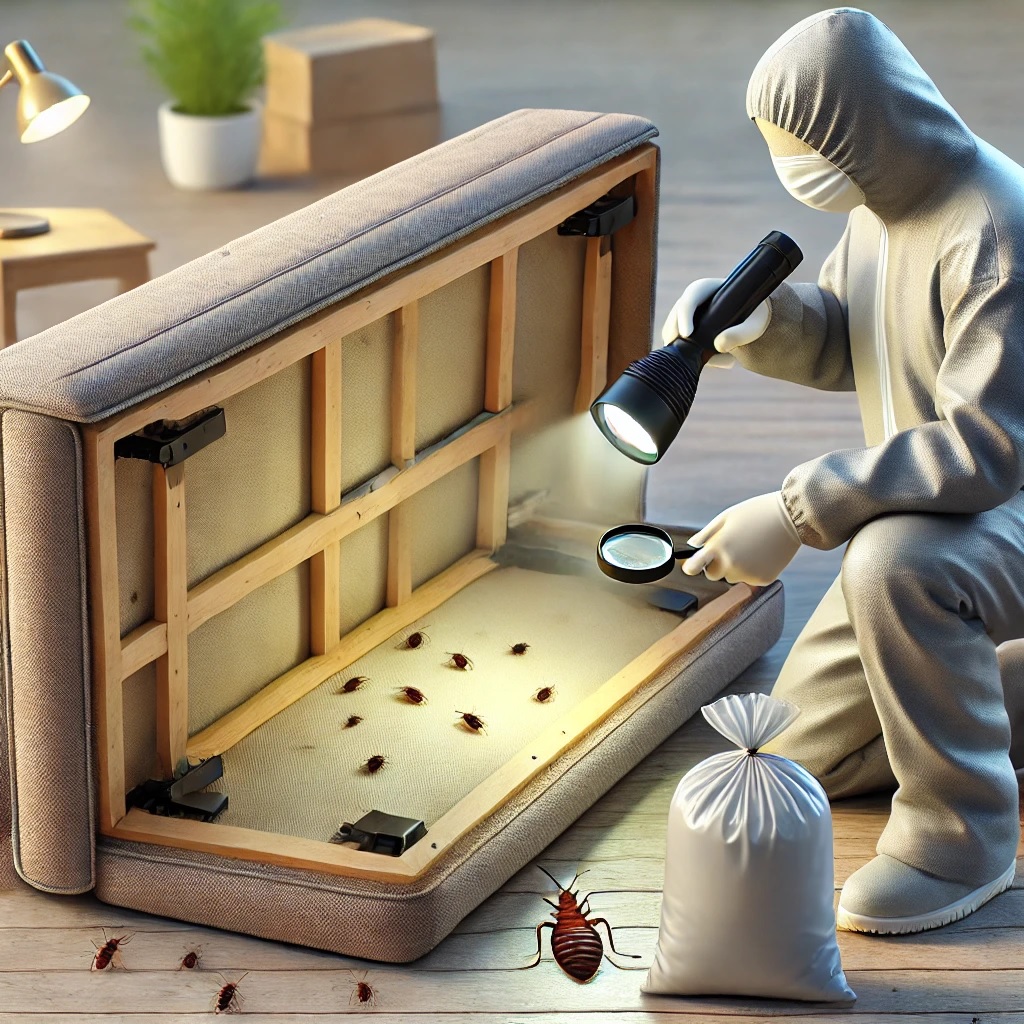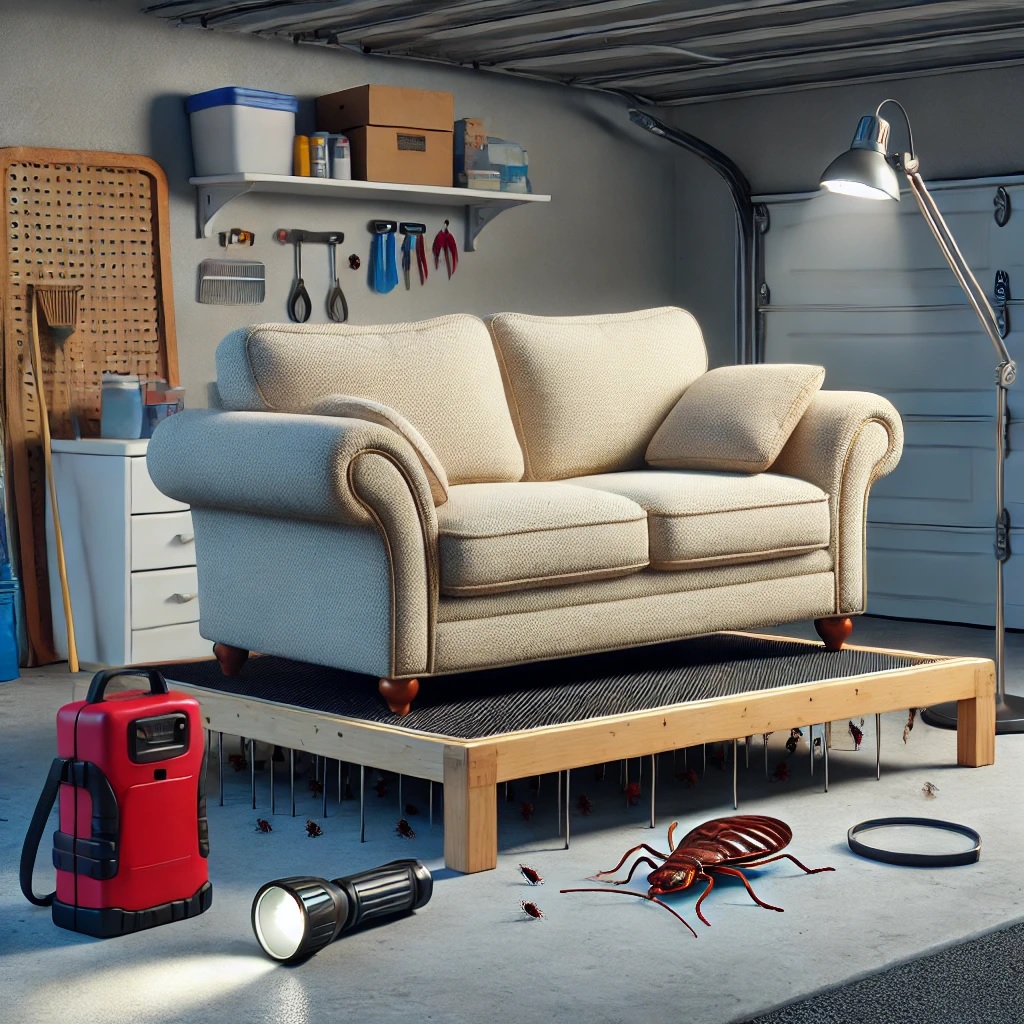There’s nothing like finding a hidden gem at a second-hand shop or snapping up a stylish vintage piece at a bargain price. But with these treasures comes a hidden risk: bed bugs. These tiny pests can easily hide in furniture, and once they’re in your home, they’re incredibly difficult to get rid of.
At Thermopest, we’ve seen far too many cases where a lovely piece of furniture became the gateway to a bed bug infestation. But don’t worry—you can avoid this with a careful inspection before bringing anything second-hand into your home. Here’s your step-by-step guide to checking second-hand furniture for bed bugs.

Bed bugs aren’t picky. They’ll happily make themselves at home in just about any piece of furniture, as long as they have somewhere to hide. Sofas, mattresses, wooden furniture with cracks, or anything with upholstery are perfect hiding spots for these pests. They’re small, sneaky, and incredibly hard to spot if you don’t know what you’re looking for.
In second-hand furniture, bed bugs can hide in seams, cracks, and joints, making it easy for them to travel from one home to the next. That’s why it’s so important to inspect anything thoroughly before bringing it into your space.
Before diving into your inspection, it’s a good idea to gather a few simple tools. You don’t need much, but these items can make spotting bed bugs easier.
Now that you’re armed with the right tools, let’s get down to the inspection process. Follow these steps to ensure you’re not bringing any uninvited guests into your home.
Before you get into the nooks and crannies, take a general look at the furniture. Look at the seams of upholstery, around buttons or tufts, and in any cracks or joints. Bed bugs are small, but they often leave behind tell-tale signs like tiny black dots (their faeces) or pale yellow skins that they shed as they grow.
What are you looking for? Bed bugs are small, reddish-brown, and about the size of an apple seed. If you see them, it’s pretty clear what you’re dealing with. But even if you don’t spot the bugs themselves, keep an eye out for:
Bed bugs love tight spaces. If you’re inspecting wooden furniture, be sure to check in the joints, underneath drawers, and in any cracks. Use your flashlight and magnifying glass to look closely. Bed bugs can squeeze into tiny spaces, so leave no stone unturned.
If the furniture has cushions, zippers, or removable covers, be sure to check underneath and inside. Bed bugs like to hide in fabric folds, under cushions, and between cracks. With wooden furniture, check the undersides and backs of drawers as well.
Bed bug eggs are small, sticky, and usually white or cream-coloured. They can be found in tight spaces like mattress seams, wood joints, or underneath fabric. These are harder to spot but are a clear sign that the furniture could be harbouring bed bugs.
If you suspect bed bugs but haven’t seen any clear signs yet, use a trap or sticky tape to pick up anything that might be crawling around. You can place traps under the legs of the furniture or use tape to lift any bugs or eggs you find during your inspection.
So, you’ve done a thorough check and—unfortunately—found signs of bed bugs. What’s next?
First things first: don’t bring it inside! If the furniture is already in your home, move it to a garage or another isolated area to prevent the bed bugs from spreading.
For items that can be salvaged, you’ll need to thoroughly clean and treat the furniture. This might involve steam cleaning, applying a bed bug spray, or even using heat treatment to kill any eggs or bugs hiding deep in the fabric or wood.
If the piece is heavily infested, it’s probably best to walk away. No piece of furniture is worth the hassle of dealing with a full-blown bed bug infestation. Trust your instincts—if it looks like it’s been home to bed bugs, it’s better to be safe than sorry.
If you’re unsure or the infestation seems significant, it’s time to call in the professionals. At Thermopest, we can help assess the situation and provide the right treatment options to ensure bed bugs don’t make it into your home.
So, you’ve found a piece of furniture you love, and it’s passed the bed bug test. Great! But you’re not off the hook just yet. Here’s how to make sure your new find doesn’t bring any unwelcome pests into your home.
If possible, wash any removable fabrics like cushion covers or pillows on a hot wash cycle (at least 60°C) to kill any potential bed bugs or eggs. For wooden furniture, a good wipe-down with a safe, bed bug-specific spray can help.
Once you’ve brought the furniture inside, use bed bug interceptors under the legs. These little traps catch any bed bugs that might try to crawl off the furniture and into other areas of your home. It’s a simple, affordable way to add extra protection.
If possible, keep your new furniture isolated for a few days before fully bringing it into your home. This gives you a chance to monitor it for any signs of bed bugs that might have been missed during the initial inspection.
While it’s tempting to snap up a bargain from a car boot sale or online marketplace, it’s best to buy from reputable second-hand shops that inspect furniture before selling it. This way, you can be a little more confident that the items are bug-free.
If something seems off—if the furniture smells strange, looks dirty, or has too many hiding places for bed bugs—it’s probably best to give it a miss. Bed bugs are a hassle you don’t want to deal with.
Even after bringing your second-hand furniture home, it’s a good idea to keep inspecting it for the first few weeks. Catching bed bugs early can prevent a major infestation from taking hold.

Inspecting second-hand furniture for bed bugs might seem like a hassle, but trust us—it’s worth the effort. A thorough check can save you from the nightmare of dealing with an infestation later. When in doubt, walk away from questionable items, and if you need help, Thermopest is here to provide expert advice and professional pest control solutions.
By staying vigilant, you can enjoy the charm of second-hand furniture without the worry of bringing bed bugs into your home. Happy treasure hunting!